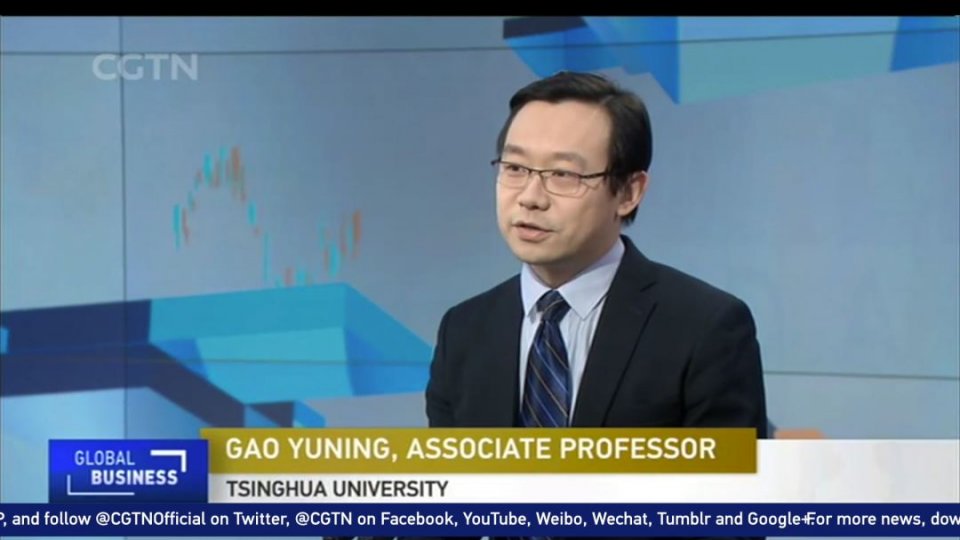下文为CGTN英文报道
高宇宁做客CGTN解读中美经贸问题副部级磋商
【编者按】1月10日,商务部在其网站上发布了一则简短声明:
1月7日至9日,中美双方在北京举行经贸问题副部级磋商。双方积极落实两国元首重要共识,就共同关注的贸易问题和结构性问题进行了广泛、深入、细致的交流,增进了相互理解,为解决彼此关切问题奠定了基础。双方同意继续保持密切联系。
就此,中国国际电视台(CGTN)在当天播出的节目CLOBAL BUSSINESS 中采访了清华大学公共管理学院副教授、国情研究院副研究员高宇宁。

▲ 清华大学公共管理学院副教授、国情研究院副研究员高宇宁做客CGTN
——中美双方都同意继续保持密切联系,但没有任何磋商细节被公布出来。这可以有三种理解。
第一种:双方都对磋商结果表示“积极”,但双方对这个“积极”有不同的理解。磋商延长一天,也说明双方想更深入得达成一些结论。第二种:本次磋商是副部级磋商,目前还没有任何磋商细节,也许说明双方需要向更高一级决策者反馈、讨论是否满足本方要求。第三种解读是:开放,即我们欢迎更高级别的磋商以及也许更好的解决方案。
——短期内,尤其是90天的“休战”期间,中美双方需要更高级别的对话磋商来达成一些让双方都满意的、切实的一致。
也许到90天期限的时候,市场能有一些更好的表现。展望稍长一些,我们或许可以期待中美各自的税改红利对股市的影响。中期来说,2020年大选之前的“激烈竞争”或许会给市场带去不小的影响。但长期来说,制度改革对市场的影响最为明显。
——目前中国正在经历多个结构性改革。
比如,中国正在从生产力导向型经济转向消费导向型经济,在不远的将来进口关税也会是中国自身改革中需要考虑的问题。比如,中国正从高速发展转向高质量发展,这意味着知识产权保护、创新驱动力等领域也需要更多关注。再比如,私营部门在所有制改革中也占据越来越重要的位置,如何保证竞争中立也是我们需要考虑的。目前,从外部(美国)带给我们的问题,不少都是在未来需要我们积极解决的问题。
Progress made on China-U.S. trade talks, future seems bright
By CGTN's Global business
China and the U.S. both expressed a positive attitude after mid-level trade talks wrapped up in Beijing on Wednesday, the first in-person trade negotiations since a temporary tariff truce was declared last month.
China's Ministry of Commerce (MOFCOM) said in a statement Thursday morning that the three-day discussions "laid the foundation" for resolving the trade issue between the two countries and "the two sides have conducted a comprehensive, deep and detailed discussion on trade and structural issues… Both sides have agreed to continue to keep close contact."
U.S. President Donald Trump also expressed optimism on Tuesday and tweeted "Talks with China are going very well!"
The two sides remain positive, though there is no details of the outcome.
What was meant by the term "positive" was interpreted differently from both sides. The extent of an extra day of the negotiation could mean that both sides want to reach a deeper solution. "Because we don't see any outcome… that means both sides need to go back to talk to their higher-level decision makers, which also means that it opens the future to better solutions later," said Gao Yuning, professor from Tsinghua University.
This round of talks also clears the way for more senior-level discussions which could take place later. Foreign media have reported that higher-level decision-makers may meet at the World Economic Forum in Davos, Switzerland later this month.
"Before the 90-day ceasefire, there definitely needs a higher-level negotiation, trying to reach some real deals that satisfies both sides," said Gao.
While China's economy is continuing to go through some restructuring, some structural issues in the talks are related to China's comprehensive deepening of reform and opening-up, such as safeguarding intellectual property rights and tariff cuts.
"Those outside factors give a very clear stimulus for us. We transferred from a production-dominated economy to a more consumption-driven economy, the import tariff issue will become a very important issue for our own market. We also transferred from a quantitative growth to high quality development. That means we need to pay attention to intellectual property and innovative driven growth, which is also the same direction," said Gao.
He also added that as China turns into a more open economy, the obstacles that we face today won't be a problem anymore.
Until today, 40 days out of the truce between two countries have passed. China has been working to resolve the trade disputes and also made steps to address U.S. concerns, including opening its financial market, resuming soybean purchases and paying more attention to technology transfers. But whether a result will be hammered out depends on the joint efforts from both sides.



